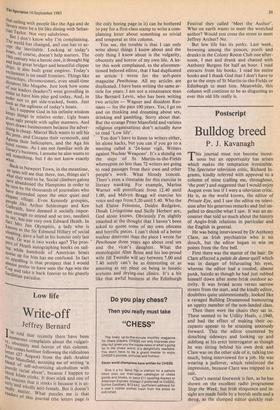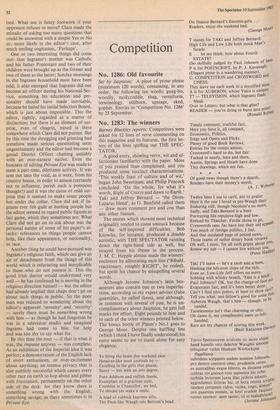Postscript
Bulldog breed
P. J. Kavanagh
rr his journal must not become incest- ' uous but an opportunity has arisen which makes the temptation irresistible. The Spectator television critic, Richard In- grams, kindly referred with approval to a column of mine (calling me, throughout, 'the poet') and suggested that I would enjoy August even less if I were a television critic. He is, as the world knows, the editor of Private Eye, and I saw the editor on televi- sion after his generous remarks and feel im- pelled to describe what I saw. Itwas an en- counter that told us much about the history of Anglo-Irish relations in particular and the English in general.
He was being interviewed by Dr Anthony Clare, an Irish psychiatrist who is no slouch, but the editor began to win on points from the first bell.
First there was the matter of the hair. Dr Clare affected a palais de danse quiff which was in danger of bifurcating his eyes, whereas the editor had a tousled, almost punk, hairdo as though he had just rubbed himself down after some brisk outdoor ac- tivity. It was broad acres versus narrow streets from the start, and the kindly editor, doubtless quite unintentionally, looked like a ravaged Bulldog Drummond humouring an uppity member of the non-landed class.
Then there were the chairs they sat in. These seemed to be Utility Heals, c.I940, and had the effect of making their oc- cupants appear to be straining anxiously forward. This the editor countered by slouching sideways and looking up and sidelong at his erect interrogator as though he was sitting behind his own desk and Clare was on the other side of it, talking too much, being interviewed for a job. He was wearing a pullover, which reinforced the impression, because Clare was trapped in a suit.
Clare's mental footwork is fast, as he has shown on the excellent radio programme Stop the Week, but Irish eloquence and in- sight are made futile by a boyish smile and a shrug, as the slumped editor quickly real- ised. What use is fancy footwork if your opponent refuses to move? Clare made the mistake of asking too many questions that could be answered with a simple Yes or No or, more likely in the editor's case, after much smiling cogitation, 'Perhaps'.
One or two interesting things did come out: that lngrams's mother was Catholic
and his father Protestant and two of their children were brought up as the former and two of them as the latter; Sunday mornings in the Ingrams household must have been odd; it also emerged that Ingrams did not become an officer during his National Ser- vice, something his education and per- sonality should have made inevitable, because he failed his initial Selection Board, which is just about impossible. This the editor, rightly, regarded as a matter of distinction; but there is an element of sur- prise, even of chagrin, mixed in there somewhere which Clare did not pursue. But by this time the shrugging and grinning had somehow made serious questioning seem ungentlemanly and the editor had become a genial District Officer chatting amiably with an over-earnest native. Even the business of editing Private Eye was made to seem a part-time, dilettante activity. It was sent out into the void, as it were, from his country house, in order to amuse (certainly not to influence, perish such a pompous thought!) and it was the cause of mild sur- prise that it seemed to make some people hot under the collar. Clare did ask if In- grams ever felt guilt at hurting people but the editor seemed to regard public figures as fair game, which they sometimes are. What Clare did not go on to ask about was the personal nature of some of his paper's at- tacks: references to things people cannot help, like their appearance, or nationality, or race.
Another thing he could have pursued was
Ingrams's religious faith, which can give an air of detachment from the things of this world which is infuriating and inexplicable to those who do not possess it. This the good Irish doctor would understand very well — he has confessed he is moving in the religious direction himself — but the editor had already implied that chaps don't go on about such things in public. So the poor man was reduced to wondering about the editor's apparent 'serenity' and 'security' — surely there must be something wrong with him — as though he had forgotten he was in a television studio and imagined Ingrams had come to him for help and was too shy to say what for.
By this time the rout — if that is what it was, the impasse anyway — was complete:.
As an exhibition of the Imperial idea it was perfect; a demonstration of the English lack of overt enthusiasm, or over-excitement about anything; an intense privacy that is also publicly successful which causes every other race on earth to hop about and gibber with frustration, permanently on the other side of the desk: for they know there is something wrong with the English, something savage; as there sometimes is in Private Eye.







































 Previous page
Previous page